Organisational Behaviour: Impact of Culture, Politics and Motivation
VerifiedAdded on 2023/06/17
|17
|5109
|431
Report
AI Summary
This report delves into organisational behaviour, focusing on the influence of culture, politics, and power on individual and team behaviour within Morrison, a major UK supermarket chain. It analyses organisational culture using Handy's model, explores power dynamics through Raven's model, and discusses the impact of organisational politics on productivity and employee relations. Furthermore, the report evaluates content and process theories of motivation, including Maslow's hierarchy of needs, Herzberg's two-factor theory, and Vroom's expectancy theory, to understand how to effectively achieve organisational goals. Finally, it examines the characteristics of effective and ineffective teams, referencing Tuckman's theory and path-goal theory, to provide a comprehensive understanding of organisational dynamics. Desklib provides a platform for students to access similar solved assignments and study tools.
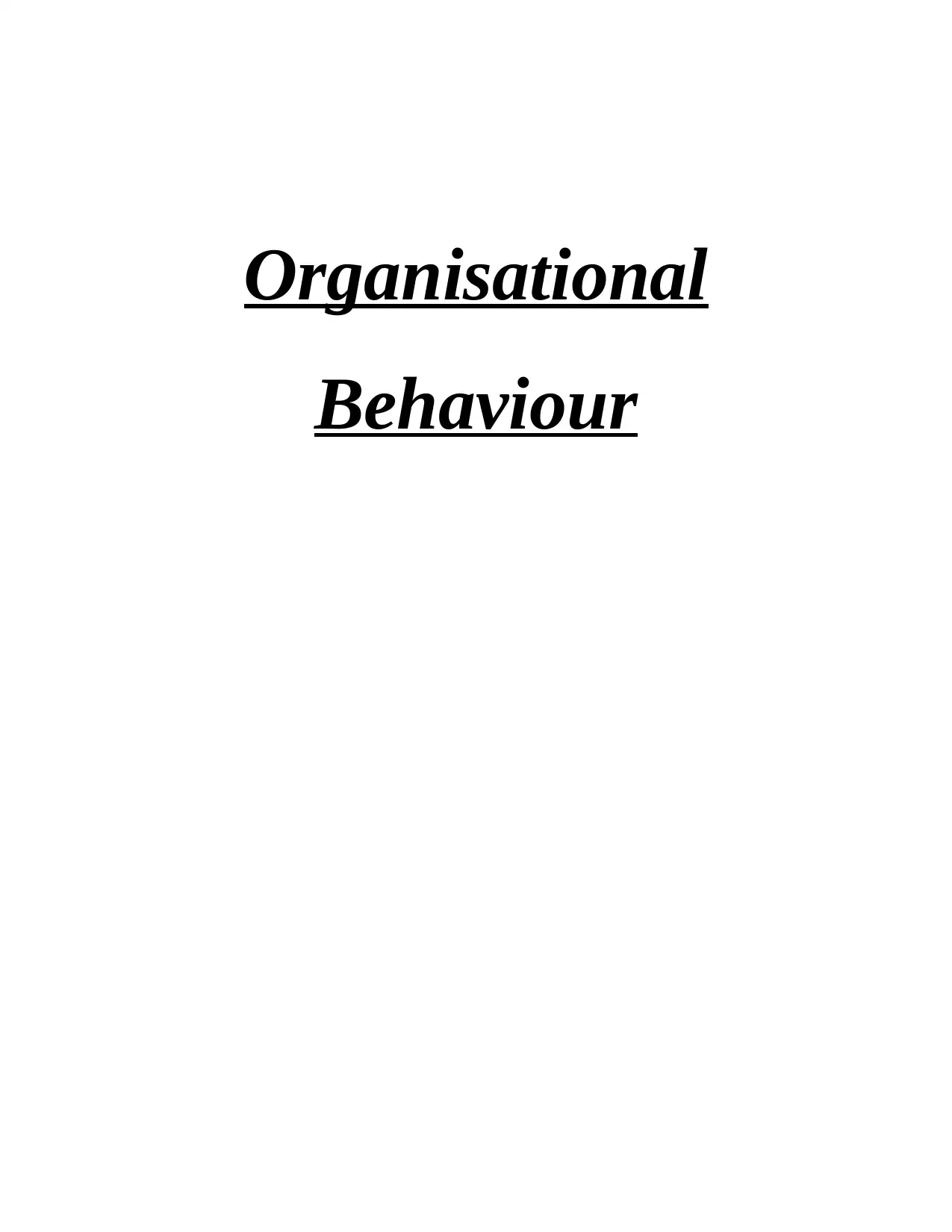
Organisational
Behaviour
Behaviour
Paraphrase This Document
Need a fresh take? Get an instant paraphrase of this document with our AI Paraphraser

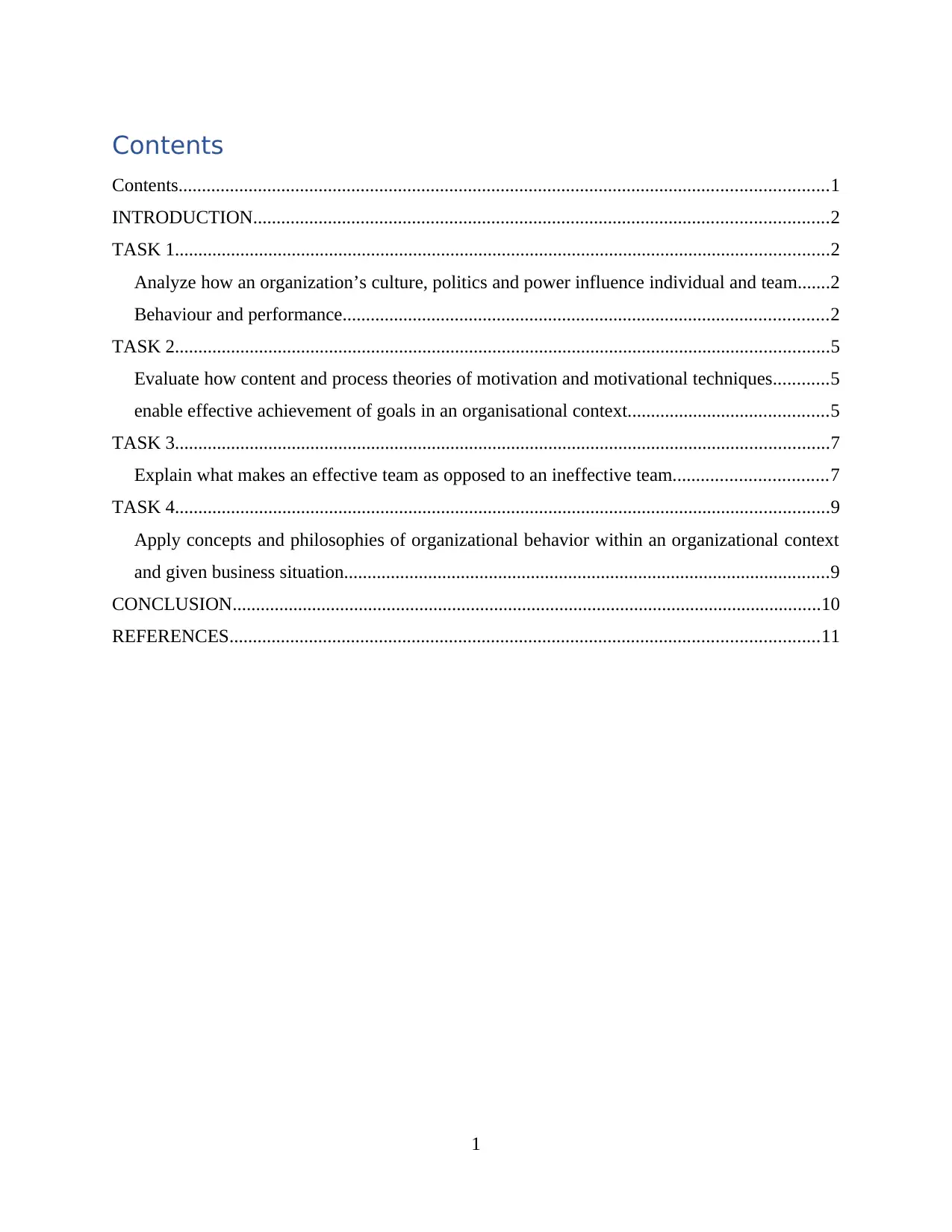
Contents
Contents...........................................................................................................................................1
INTRODUCTION...........................................................................................................................2
TASK 1............................................................................................................................................2
Analyze how an organization’s culture, politics and power influence individual and team.......2
Behaviour and performance........................................................................................................2
TASK 2............................................................................................................................................5
Evaluate how content and process theories of motivation and motivational techniques............5
enable effective achievement of goals in an organisational context...........................................5
TASK 3............................................................................................................................................7
Explain what makes an effective team as opposed to an ineffective team.................................7
TASK 4............................................................................................................................................9
Apply concepts and philosophies of organizational behavior within an organizational context
and given business situation........................................................................................................9
CONCLUSION..............................................................................................................................10
REFERENCES..............................................................................................................................11
1
Contents...........................................................................................................................................1
INTRODUCTION...........................................................................................................................2
TASK 1............................................................................................................................................2
Analyze how an organization’s culture, politics and power influence individual and team.......2
Behaviour and performance........................................................................................................2
TASK 2............................................................................................................................................5
Evaluate how content and process theories of motivation and motivational techniques............5
enable effective achievement of goals in an organisational context...........................................5
TASK 3............................................................................................................................................7
Explain what makes an effective team as opposed to an ineffective team.................................7
TASK 4............................................................................................................................................9
Apply concepts and philosophies of organizational behavior within an organizational context
and given business situation........................................................................................................9
CONCLUSION..............................................................................................................................10
REFERENCES..............................................................................................................................11
1
⊘ This is a preview!⊘
Do you want full access?
Subscribe today to unlock all pages.

Trusted by 1+ million students worldwide
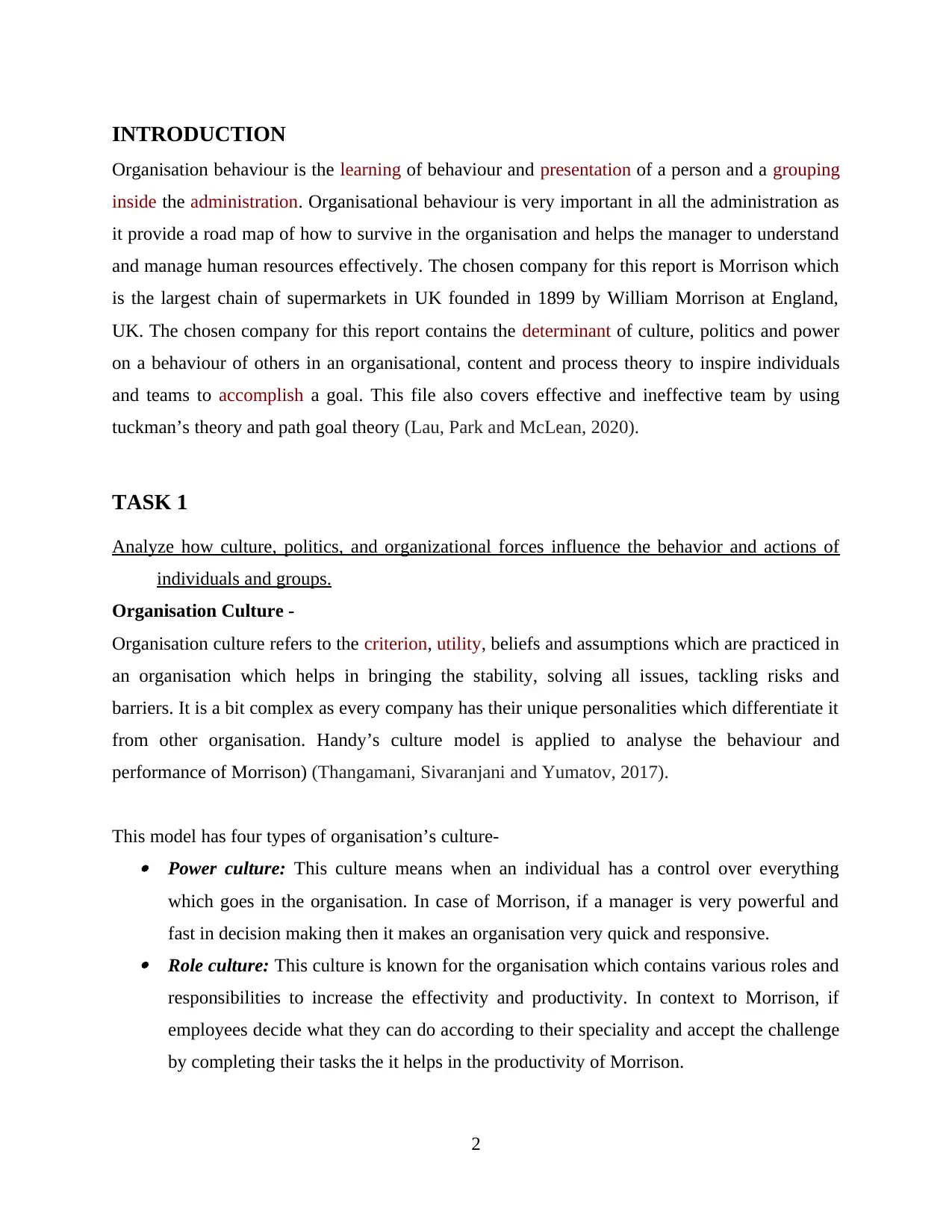
INTRODUCTION
Organisation behaviour is the learning of behaviour and presentation of a person and a grouping
inside the administration. Organisational behaviour is very important in all the administration as
it provide a road map of how to survive in the organisation and helps the manager to understand
and manage human resources effectively. The chosen company for this report is Morrison which
is the largest chain of supermarkets in UK founded in 1899 by William Morrison at England,
UK. The chosen company for this report contains the determinant of culture, politics and power
on a behaviour of others in an organisational, content and process theory to inspire individuals
and teams to accomplish a goal. This file also covers effective and ineffective team by using
tuckman’s theory and path goal theory (Lau, Park and McLean, 2020).
TASK 1
Analyze how culture, politics, and organizational forces influence the behavior and actions of
individuals and groups.
Organisation Culture -
Organisation culture refers to the criterion, utility, beliefs and assumptions which are practiced in
an organisation which helps in bringing the stability, solving all issues, tackling risks and
barriers. It is a bit complex as every company has their unique personalities which differentiate it
from other organisation. Handy’s culture model is applied to analyse the behaviour and
performance of Morrison) (Thangamani, Sivaranjani and Yumatov, 2017).
This model has four types of organisation’s culture- Power culture: This culture means when an individual has a control over everything
which goes in the organisation. In case of Morrison, if a manager is very powerful and
fast in decision making then it makes an organisation very quick and responsive. Role culture: This culture is known for the organisation which contains various roles and
responsibilities to increase the effectivity and productivity. In context to Morrison, if
employees decide what they can do according to their speciality and accept the challenge
by completing their tasks the it helps in the productivity of Morrison.
2
Organisation behaviour is the learning of behaviour and presentation of a person and a grouping
inside the administration. Organisational behaviour is very important in all the administration as
it provide a road map of how to survive in the organisation and helps the manager to understand
and manage human resources effectively. The chosen company for this report is Morrison which
is the largest chain of supermarkets in UK founded in 1899 by William Morrison at England,
UK. The chosen company for this report contains the determinant of culture, politics and power
on a behaviour of others in an organisational, content and process theory to inspire individuals
and teams to accomplish a goal. This file also covers effective and ineffective team by using
tuckman’s theory and path goal theory (Lau, Park and McLean, 2020).
TASK 1
Analyze how culture, politics, and organizational forces influence the behavior and actions of
individuals and groups.
Organisation Culture -
Organisation culture refers to the criterion, utility, beliefs and assumptions which are practiced in
an organisation which helps in bringing the stability, solving all issues, tackling risks and
barriers. It is a bit complex as every company has their unique personalities which differentiate it
from other organisation. Handy’s culture model is applied to analyse the behaviour and
performance of Morrison) (Thangamani, Sivaranjani and Yumatov, 2017).
This model has four types of organisation’s culture- Power culture: This culture means when an individual has a control over everything
which goes in the organisation. In case of Morrison, if a manager is very powerful and
fast in decision making then it makes an organisation very quick and responsive. Role culture: This culture is known for the organisation which contains various roles and
responsibilities to increase the effectivity and productivity. In context to Morrison, if
employees decide what they can do according to their speciality and accept the challenge
by completing their tasks the it helps in the productivity of Morrison.
2
Paraphrase This Document
Need a fresh take? Get an instant paraphrase of this document with our AI Paraphraser
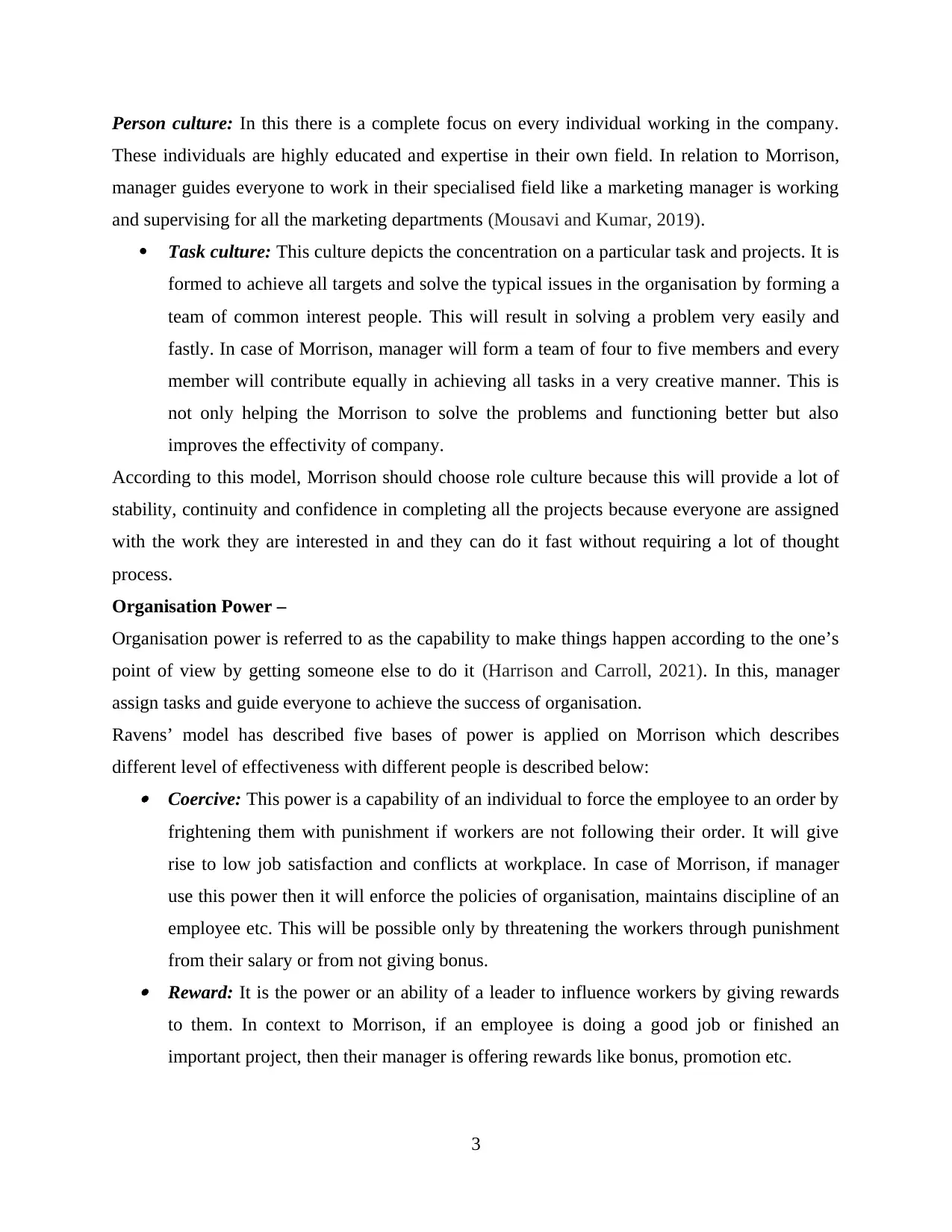
Person culture: In this there is a complete focus on every individual working in the company.
These individuals are highly educated and expertise in their own field. In relation to Morrison,
manager guides everyone to work in their specialised field like a marketing manager is working
and supervising for all the marketing departments (Mousavi and Kumar, 2019).
Task culture: This culture depicts the concentration on a particular task and projects. It is
formed to achieve all targets and solve the typical issues in the organisation by forming a
team of common interest people. This will result in solving a problem very easily and
fastly. In case of Morrison, manager will form a team of four to five members and every
member will contribute equally in achieving all tasks in a very creative manner. This is
not only helping the Morrison to solve the problems and functioning better but also
improves the effectivity of company.
According to this model, Morrison should choose role culture because this will provide a lot of
stability, continuity and confidence in completing all the projects because everyone are assigned
with the work they are interested in and they can do it fast without requiring a lot of thought
process.
Organisation Power –
Organisation power is referred to as the capability to make things happen according to the one’s
point of view by getting someone else to do it (Harrison and Carroll, 2021). In this, manager
assign tasks and guide everyone to achieve the success of organisation.
Ravens’ model has described five bases of power is applied on Morrison which describes
different level of effectiveness with different people is described below: Coercive: This power is a capability of an individual to force the employee to an order by
frightening them with punishment if workers are not following their order. It will give
rise to low job satisfaction and conflicts at workplace. In case of Morrison, if manager
use this power then it will enforce the policies of organisation, maintains discipline of an
employee etc. This will be possible only by threatening the workers through punishment
from their salary or from not giving bonus. Reward: It is the power or an ability of a leader to influence workers by giving rewards
to them. In context to Morrison, if an employee is doing a good job or finished an
important project, then their manager is offering rewards like bonus, promotion etc.
3
These individuals are highly educated and expertise in their own field. In relation to Morrison,
manager guides everyone to work in their specialised field like a marketing manager is working
and supervising for all the marketing departments (Mousavi and Kumar, 2019).
Task culture: This culture depicts the concentration on a particular task and projects. It is
formed to achieve all targets and solve the typical issues in the organisation by forming a
team of common interest people. This will result in solving a problem very easily and
fastly. In case of Morrison, manager will form a team of four to five members and every
member will contribute equally in achieving all tasks in a very creative manner. This is
not only helping the Morrison to solve the problems and functioning better but also
improves the effectivity of company.
According to this model, Morrison should choose role culture because this will provide a lot of
stability, continuity and confidence in completing all the projects because everyone are assigned
with the work they are interested in and they can do it fast without requiring a lot of thought
process.
Organisation Power –
Organisation power is referred to as the capability to make things happen according to the one’s
point of view by getting someone else to do it (Harrison and Carroll, 2021). In this, manager
assign tasks and guide everyone to achieve the success of organisation.
Ravens’ model has described five bases of power is applied on Morrison which describes
different level of effectiveness with different people is described below: Coercive: This power is a capability of an individual to force the employee to an order by
frightening them with punishment if workers are not following their order. It will give
rise to low job satisfaction and conflicts at workplace. In case of Morrison, if manager
use this power then it will enforce the policies of organisation, maintains discipline of an
employee etc. This will be possible only by threatening the workers through punishment
from their salary or from not giving bonus. Reward: It is the power or an ability of a leader to influence workers by giving rewards
to them. In context to Morrison, if an employee is doing a good job or finished an
important project, then their manager is offering rewards like bonus, promotion etc.
3
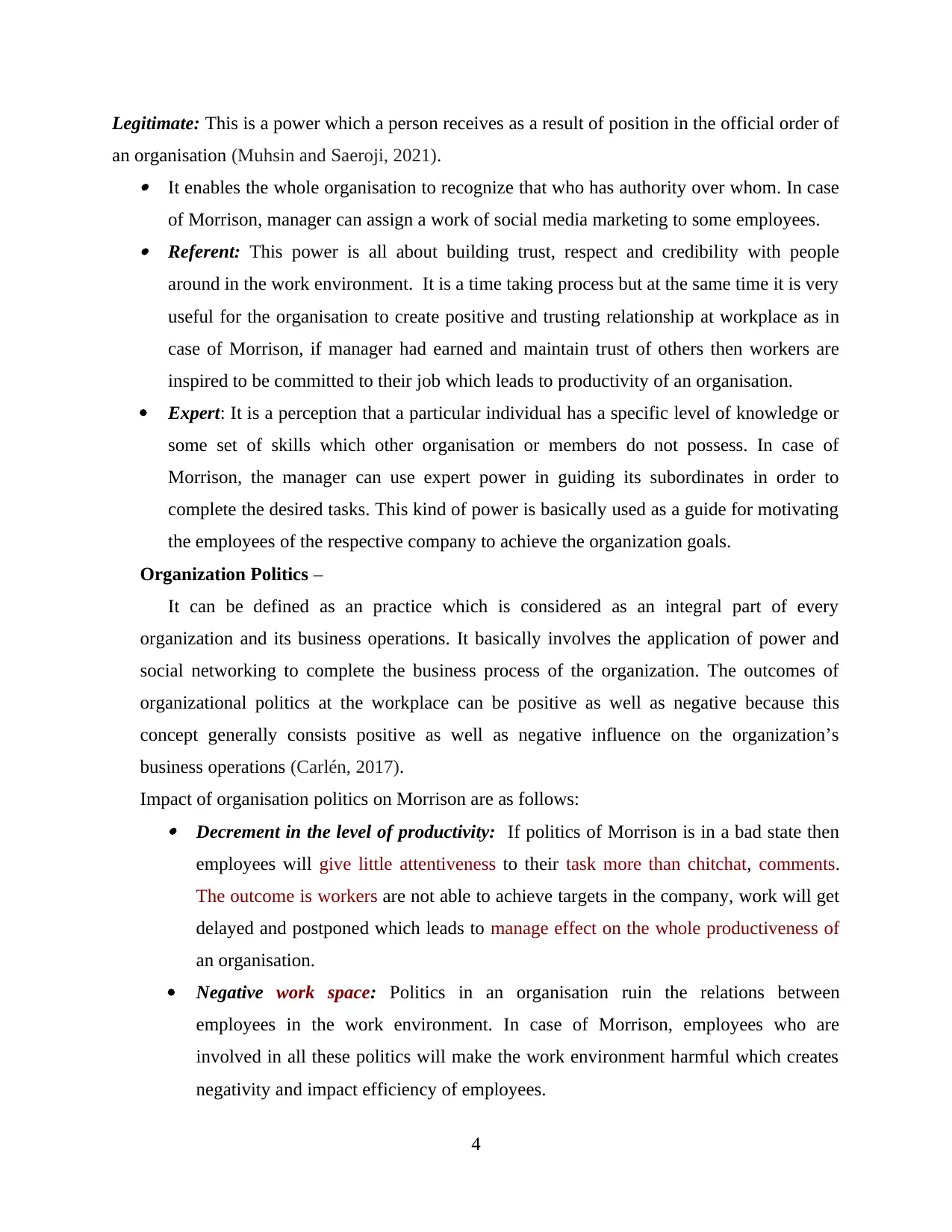
Legitimate: This is a power which a person receives as a result of position in the official order of
an organisation (Muhsin and Saeroji, 2021). It enables the whole organisation to recognize that who has authority over whom. In case
of Morrison, manager can assign a work of social media marketing to some employees. Referent: This power is all about building trust, respect and credibility with people
around in the work environment. It is a time taking process but at the same time it is very
useful for the organisation to create positive and trusting relationship at workplace as in
case of Morrison, if manager had earned and maintain trust of others then workers are
inspired to be committed to their job which leads to productivity of an organisation.
Expert: It is a perception that a particular individual has a specific level of knowledge or
some set of skills which other organisation or members do not possess. In case of
Morrison, the manager can use expert power in guiding its subordinates in order to
complete the desired tasks. This kind of power is basically used as a guide for motivating
the employees of the respective company to achieve the organization goals.
Organization Politics –
It can be defined as an practice which is considered as an integral part of every
organization and its business operations. It basically involves the application of power and
social networking to complete the business process of the organization. The outcomes of
organizational politics at the workplace can be positive as well as negative because this
concept generally consists positive as well as negative influence on the organization’s
business operations (Carlén, 2017).
Impact of organisation politics on Morrison are as follows:
Decrement in the level of productivity: If politics of Morrison is in a bad state then
employees will give little attentiveness to their task more than chitchat, comments.
The outcome is workers are not able to achieve targets in the company, work will get
delayed and postponed which leads to manage effect on the whole productiveness of
an organisation.
Negative work space: Politics in an organisation ruin the relations between
employees in the work environment. In case of Morrison, employees who are
involved in all these politics will make the work environment harmful which creates
negativity and impact efficiency of employees.
4
an organisation (Muhsin and Saeroji, 2021). It enables the whole organisation to recognize that who has authority over whom. In case
of Morrison, manager can assign a work of social media marketing to some employees. Referent: This power is all about building trust, respect and credibility with people
around in the work environment. It is a time taking process but at the same time it is very
useful for the organisation to create positive and trusting relationship at workplace as in
case of Morrison, if manager had earned and maintain trust of others then workers are
inspired to be committed to their job which leads to productivity of an organisation.
Expert: It is a perception that a particular individual has a specific level of knowledge or
some set of skills which other organisation or members do not possess. In case of
Morrison, the manager can use expert power in guiding its subordinates in order to
complete the desired tasks. This kind of power is basically used as a guide for motivating
the employees of the respective company to achieve the organization goals.
Organization Politics –
It can be defined as an practice which is considered as an integral part of every
organization and its business operations. It basically involves the application of power and
social networking to complete the business process of the organization. The outcomes of
organizational politics at the workplace can be positive as well as negative because this
concept generally consists positive as well as negative influence on the organization’s
business operations (Carlén, 2017).
Impact of organisation politics on Morrison are as follows:
Decrement in the level of productivity: If politics of Morrison is in a bad state then
employees will give little attentiveness to their task more than chitchat, comments.
The outcome is workers are not able to achieve targets in the company, work will get
delayed and postponed which leads to manage effect on the whole productiveness of
an organisation.
Negative work space: Politics in an organisation ruin the relations between
employees in the work environment. In case of Morrison, employees who are
involved in all these politics will make the work environment harmful which creates
negativity and impact efficiency of employees.
4
⊘ This is a preview!⊘
Do you want full access?
Subscribe today to unlock all pages.

Trusted by 1+ million students worldwide
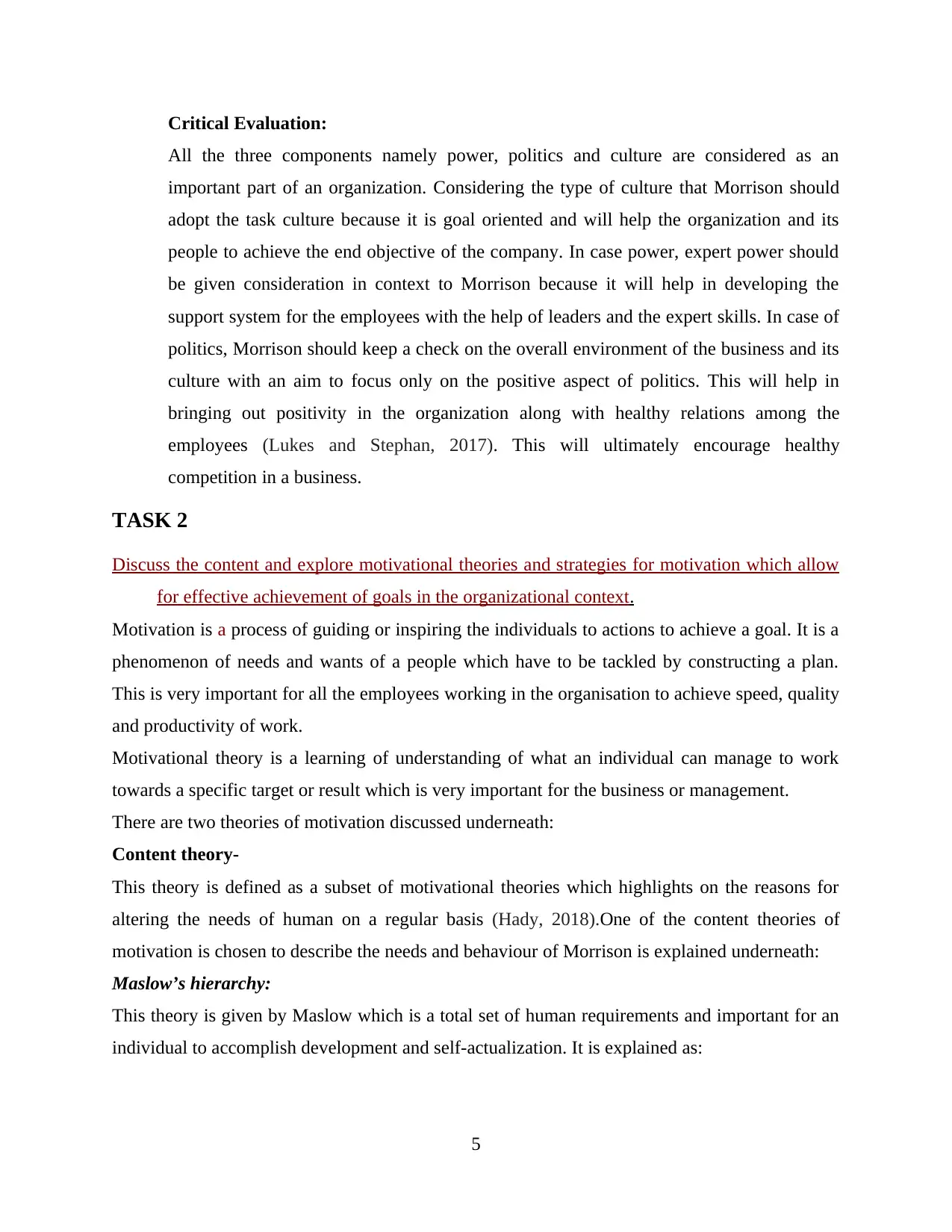
Critical Evaluation:
All the three components namely power, politics and culture are considered as an
important part of an organization. Considering the type of culture that Morrison should
adopt the task culture because it is goal oriented and will help the organization and its
people to achieve the end objective of the company. In case power, expert power should
be given consideration in context to Morrison because it will help in developing the
support system for the employees with the help of leaders and the expert skills. In case of
politics, Morrison should keep a check on the overall environment of the business and its
culture with an aim to focus only on the positive aspect of politics. This will help in
bringing out positivity in the organization along with healthy relations among the
employees (Lukes and Stephan, 2017). This will ultimately encourage healthy
competition in a business.
TASK 2
Discuss the content and explore motivational theories and strategies for motivation which allow
for effective achievement of goals in the organizational context.
Motivation is a process of guiding or inspiring the individuals to actions to achieve a goal. It is a
phenomenon of needs and wants of a people which have to be tackled by constructing a plan.
This is very important for all the employees working in the organisation to achieve speed, quality
and productivity of work.
Motivational theory is a learning of understanding of what an individual can manage to work
towards a specific target or result which is very important for the business or management.
There are two theories of motivation discussed underneath:
Content theory-
This theory is defined as a subset of motivational theories which highlights on the reasons for
altering the needs of human on a regular basis (Hady, 2018).One of the content theories of
motivation is chosen to describe the needs and behaviour of Morrison is explained underneath:
Maslow’s hierarchy:
This theory is given by Maslow which is a total set of human requirements and important for an
individual to accomplish development and self-actualization. It is explained as:
5
All the three components namely power, politics and culture are considered as an
important part of an organization. Considering the type of culture that Morrison should
adopt the task culture because it is goal oriented and will help the organization and its
people to achieve the end objective of the company. In case power, expert power should
be given consideration in context to Morrison because it will help in developing the
support system for the employees with the help of leaders and the expert skills. In case of
politics, Morrison should keep a check on the overall environment of the business and its
culture with an aim to focus only on the positive aspect of politics. This will help in
bringing out positivity in the organization along with healthy relations among the
employees (Lukes and Stephan, 2017). This will ultimately encourage healthy
competition in a business.
TASK 2
Discuss the content and explore motivational theories and strategies for motivation which allow
for effective achievement of goals in the organizational context.
Motivation is a process of guiding or inspiring the individuals to actions to achieve a goal. It is a
phenomenon of needs and wants of a people which have to be tackled by constructing a plan.
This is very important for all the employees working in the organisation to achieve speed, quality
and productivity of work.
Motivational theory is a learning of understanding of what an individual can manage to work
towards a specific target or result which is very important for the business or management.
There are two theories of motivation discussed underneath:
Content theory-
This theory is defined as a subset of motivational theories which highlights on the reasons for
altering the needs of human on a regular basis (Hady, 2018).One of the content theories of
motivation is chosen to describe the needs and behaviour of Morrison is explained underneath:
Maslow’s hierarchy:
This theory is given by Maslow which is a total set of human requirements and important for an
individual to accomplish development and self-actualization. It is explained as:
5
Paraphrase This Document
Need a fresh take? Get an instant paraphrase of this document with our AI Paraphraser
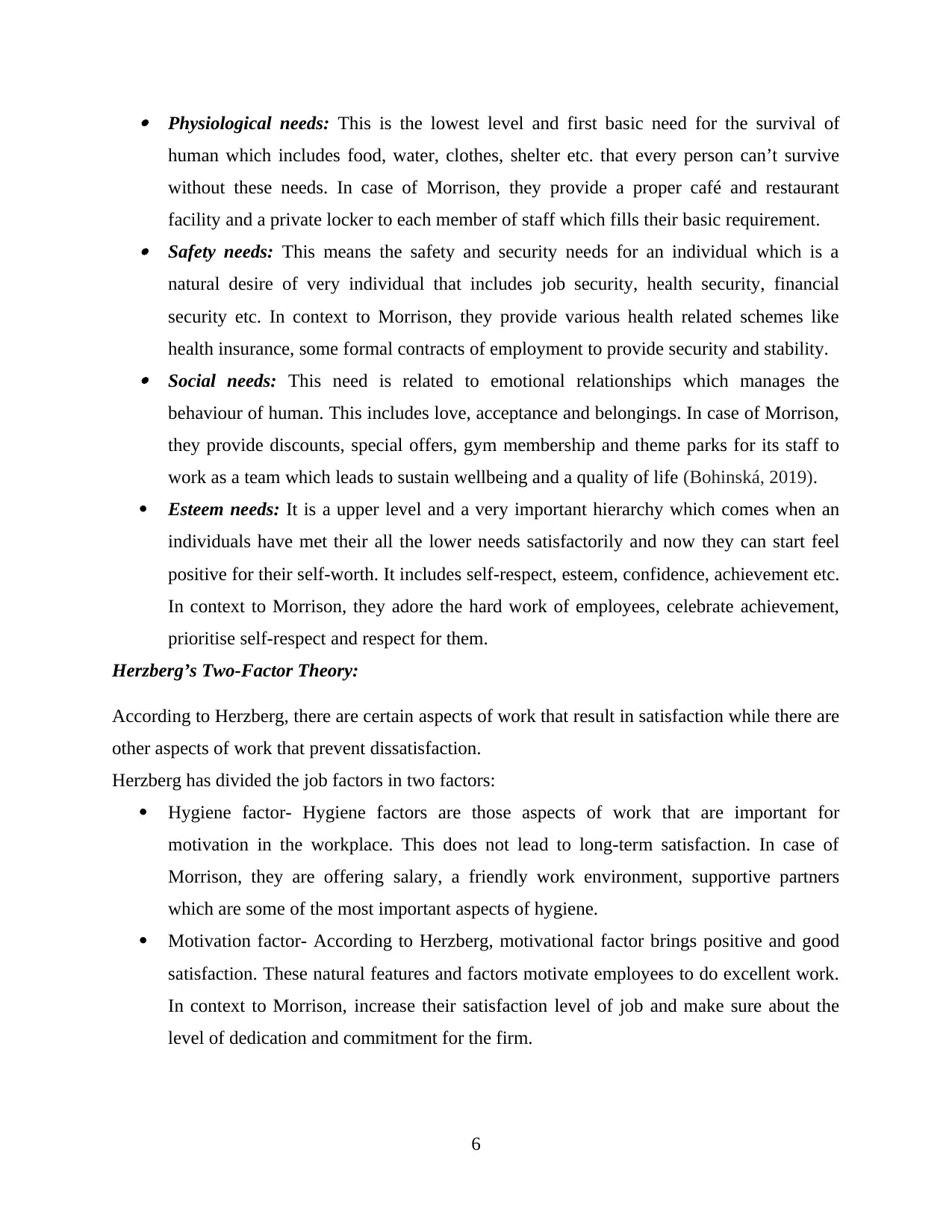
Physiological needs: This is the lowest level and first basic need for the survival of
human which includes food, water, clothes, shelter etc. that every person can’t survive
without these needs. In case of Morrison, they provide a proper café and restaurant
facility and a private locker to each member of staff which fills their basic requirement. Safety needs: This means the safety and security needs for an individual which is a
natural desire of very individual that includes job security, health security, financial
security etc. In context to Morrison, they provide various health related schemes like
health insurance, some formal contracts of employment to provide security and stability. Social needs: This need is related to emotional relationships which manages the
behaviour of human. This includes love, acceptance and belongings. In case of Morrison,
they provide discounts, special offers, gym membership and theme parks for its staff to
work as a team which leads to sustain wellbeing and a quality of life (Bohinská, 2019).
Esteem needs: It is a upper level and a very important hierarchy which comes when an
individuals have met their all the lower needs satisfactorily and now they can start feel
positive for their self-worth. It includes self-respect, esteem, confidence, achievement etc.
In context to Morrison, they adore the hard work of employees, celebrate achievement,
prioritise self-respect and respect for them.
Herzberg’s Two-Factor Theory:
According to Herzberg, there are certain aspects of work that result in satisfaction while there are
other aspects of work that prevent dissatisfaction.
Herzberg has divided the job factors in two factors:
Hygiene factor- Hygiene factors are those aspects of work that are important for
motivation in the workplace. This does not lead to long-term satisfaction. In case of
Morrison, they are offering salary, a friendly work environment, supportive partners
which are some of the most important aspects of hygiene.
Motivation factor- According to Herzberg, motivational factor brings positive and good
satisfaction. These natural features and factors motivate employees to do excellent work.
In context to Morrison, increase their satisfaction level of job and make sure about the
level of dedication and commitment for the firm.
6
human which includes food, water, clothes, shelter etc. that every person can’t survive
without these needs. In case of Morrison, they provide a proper café and restaurant
facility and a private locker to each member of staff which fills their basic requirement. Safety needs: This means the safety and security needs for an individual which is a
natural desire of very individual that includes job security, health security, financial
security etc. In context to Morrison, they provide various health related schemes like
health insurance, some formal contracts of employment to provide security and stability. Social needs: This need is related to emotional relationships which manages the
behaviour of human. This includes love, acceptance and belongings. In case of Morrison,
they provide discounts, special offers, gym membership and theme parks for its staff to
work as a team which leads to sustain wellbeing and a quality of life (Bohinská, 2019).
Esteem needs: It is a upper level and a very important hierarchy which comes when an
individuals have met their all the lower needs satisfactorily and now they can start feel
positive for their self-worth. It includes self-respect, esteem, confidence, achievement etc.
In context to Morrison, they adore the hard work of employees, celebrate achievement,
prioritise self-respect and respect for them.
Herzberg’s Two-Factor Theory:
According to Herzberg, there are certain aspects of work that result in satisfaction while there are
other aspects of work that prevent dissatisfaction.
Herzberg has divided the job factors in two factors:
Hygiene factor- Hygiene factors are those aspects of work that are important for
motivation in the workplace. This does not lead to long-term satisfaction. In case of
Morrison, they are offering salary, a friendly work environment, supportive partners
which are some of the most important aspects of hygiene.
Motivation factor- According to Herzberg, motivational factor brings positive and good
satisfaction. These natural features and factors motivate employees to do excellent work.
In context to Morrison, increase their satisfaction level of job and make sure about the
level of dedication and commitment for the firm.
6
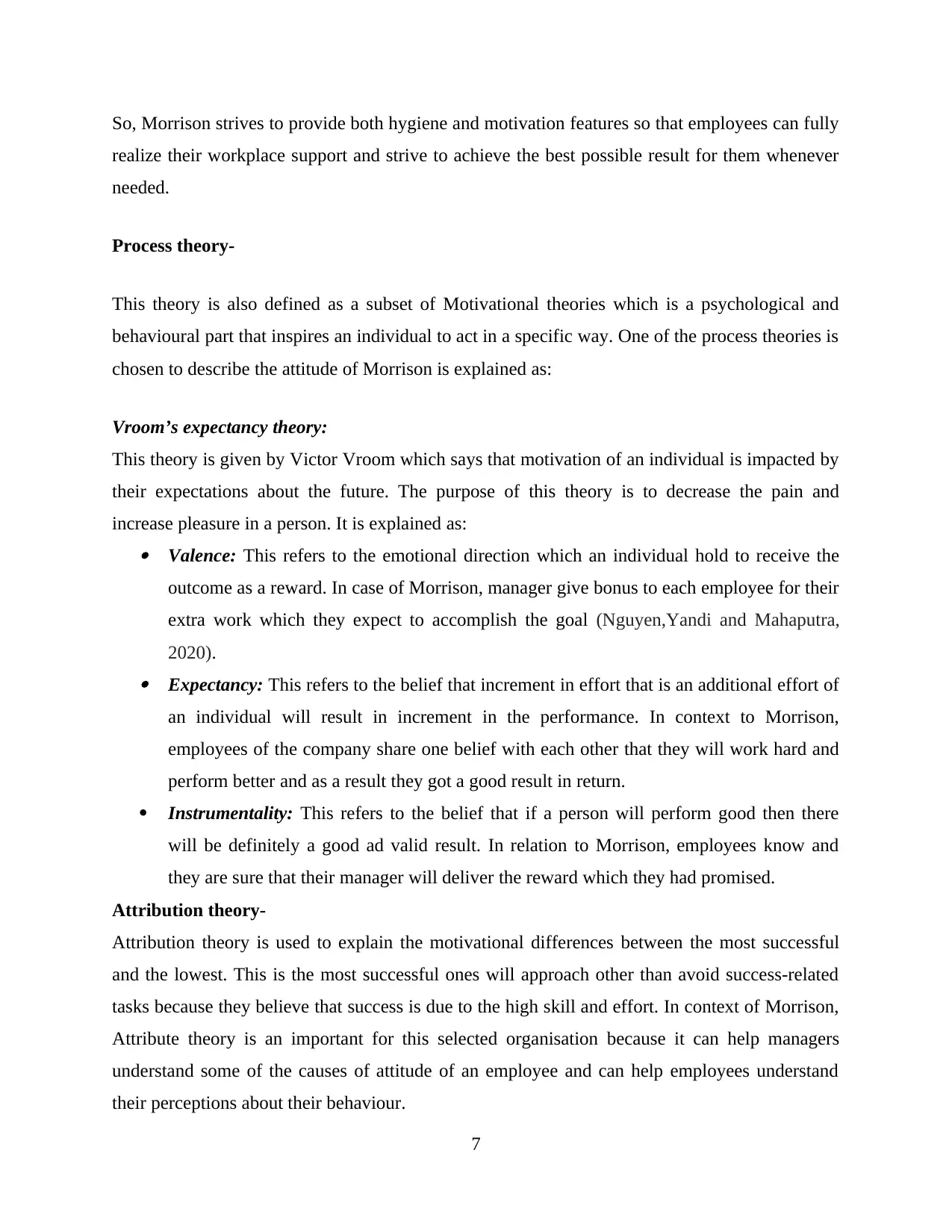
So, Morrison strives to provide both hygiene and motivation features so that employees can fully
realize their workplace support and strive to achieve the best possible result for them whenever
needed.
Process theory-
This theory is also defined as a subset of Motivational theories which is a psychological and
behavioural part that inspires an individual to act in a specific way. One of the process theories is
chosen to describe the attitude of Morrison is explained as:
Vroom’s expectancy theory:
This theory is given by Victor Vroom which says that motivation of an individual is impacted by
their expectations about the future. The purpose of this theory is to decrease the pain and
increase pleasure in a person. It is explained as: Valence: This refers to the emotional direction which an individual hold to receive the
outcome as a reward. In case of Morrison, manager give bonus to each employee for their
extra work which they expect to accomplish the goal (Nguyen,Yandi and Mahaputra,
2020). Expectancy: This refers to the belief that increment in effort that is an additional effort of
an individual will result in increment in the performance. In context to Morrison,
employees of the company share one belief with each other that they will work hard and
perform better and as a result they got a good result in return.
Instrumentality: This refers to the belief that if a person will perform good then there
will be definitely a good ad valid result. In relation to Morrison, employees know and
they are sure that their manager will deliver the reward which they had promised.
Attribution theory-
Attribution theory is used to explain the motivational differences between the most successful
and the lowest. This is the most successful ones will approach other than avoid success-related
tasks because they believe that success is due to the high skill and effort. In context of Morrison,
Attribute theory is an important for this selected organisation because it can help managers
understand some of the causes of attitude of an employee and can help employees understand
their perceptions about their behaviour.
7
realize their workplace support and strive to achieve the best possible result for them whenever
needed.
Process theory-
This theory is also defined as a subset of Motivational theories which is a psychological and
behavioural part that inspires an individual to act in a specific way. One of the process theories is
chosen to describe the attitude of Morrison is explained as:
Vroom’s expectancy theory:
This theory is given by Victor Vroom which says that motivation of an individual is impacted by
their expectations about the future. The purpose of this theory is to decrease the pain and
increase pleasure in a person. It is explained as: Valence: This refers to the emotional direction which an individual hold to receive the
outcome as a reward. In case of Morrison, manager give bonus to each employee for their
extra work which they expect to accomplish the goal (Nguyen,Yandi and Mahaputra,
2020). Expectancy: This refers to the belief that increment in effort that is an additional effort of
an individual will result in increment in the performance. In context to Morrison,
employees of the company share one belief with each other that they will work hard and
perform better and as a result they got a good result in return.
Instrumentality: This refers to the belief that if a person will perform good then there
will be definitely a good ad valid result. In relation to Morrison, employees know and
they are sure that their manager will deliver the reward which they had promised.
Attribution theory-
Attribution theory is used to explain the motivational differences between the most successful
and the lowest. This is the most successful ones will approach other than avoid success-related
tasks because they believe that success is due to the high skill and effort. In context of Morrison,
Attribute theory is an important for this selected organisation because it can help managers
understand some of the causes of attitude of an employee and can help employees understand
their perceptions about their behaviour.
7
⊘ This is a preview!⊘
Do you want full access?
Subscribe today to unlock all pages.

Trusted by 1+ million students worldwide
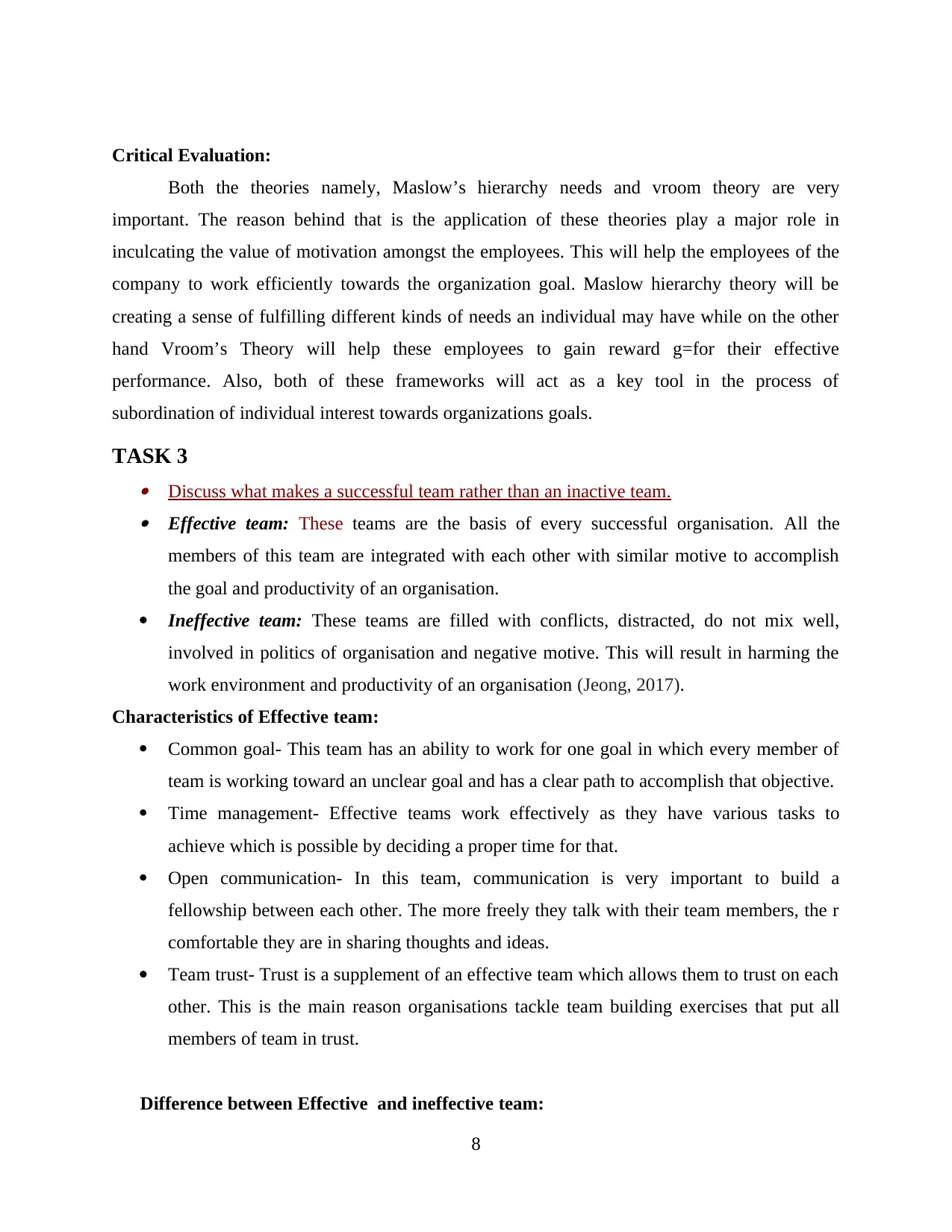
Critical Evaluation:
Both the theories namely, Maslow’s hierarchy needs and vroom theory are very
important. The reason behind that is the application of these theories play a major role in
inculcating the value of motivation amongst the employees. This will help the employees of the
company to work efficiently towards the organization goal. Maslow hierarchy theory will be
creating a sense of fulfilling different kinds of needs an individual may have while on the other
hand Vroom’s Theory will help these employees to gain reward g=for their effective
performance. Also, both of these frameworks will act as a key tool in the process of
subordination of individual interest towards organizations goals.
TASK 3 Discuss what makes a successful team rather than an inactive team. Effective team: These teams are the basis of every successful organisation. All the
members of this team are integrated with each other with similar motive to accomplish
the goal and productivity of an organisation.
Ineffective team: These teams are filled with conflicts, distracted, do not mix well,
involved in politics of organisation and negative motive. This will result in harming the
work environment and productivity of an organisation (Jeong, 2017).
Characteristics of Effective team:
Common goal- This team has an ability to work for one goal in which every member of
team is working toward an unclear goal and has a clear path to accomplish that objective.
Time management- Effective teams work effectively as they have various tasks to
achieve which is possible by deciding a proper time for that.
Open communication- In this team, communication is very important to build a
fellowship between each other. The more freely they talk with their team members, the r
comfortable they are in sharing thoughts and ideas.
Team trust- Trust is a supplement of an effective team which allows them to trust on each
other. This is the main reason organisations tackle team building exercises that put all
members of team in trust.
Difference between Effective and ineffective team:
8
Both the theories namely, Maslow’s hierarchy needs and vroom theory are very
important. The reason behind that is the application of these theories play a major role in
inculcating the value of motivation amongst the employees. This will help the employees of the
company to work efficiently towards the organization goal. Maslow hierarchy theory will be
creating a sense of fulfilling different kinds of needs an individual may have while on the other
hand Vroom’s Theory will help these employees to gain reward g=for their effective
performance. Also, both of these frameworks will act as a key tool in the process of
subordination of individual interest towards organizations goals.
TASK 3 Discuss what makes a successful team rather than an inactive team. Effective team: These teams are the basis of every successful organisation. All the
members of this team are integrated with each other with similar motive to accomplish
the goal and productivity of an organisation.
Ineffective team: These teams are filled with conflicts, distracted, do not mix well,
involved in politics of organisation and negative motive. This will result in harming the
work environment and productivity of an organisation (Jeong, 2017).
Characteristics of Effective team:
Common goal- This team has an ability to work for one goal in which every member of
team is working toward an unclear goal and has a clear path to accomplish that objective.
Time management- Effective teams work effectively as they have various tasks to
achieve which is possible by deciding a proper time for that.
Open communication- In this team, communication is very important to build a
fellowship between each other. The more freely they talk with their team members, the r
comfortable they are in sharing thoughts and ideas.
Team trust- Trust is a supplement of an effective team which allows them to trust on each
other. This is the main reason organisations tackle team building exercises that put all
members of team in trust.
Difference between Effective and ineffective team:
8
Paraphrase This Document
Need a fresh take? Get an instant paraphrase of this document with our AI Paraphraser
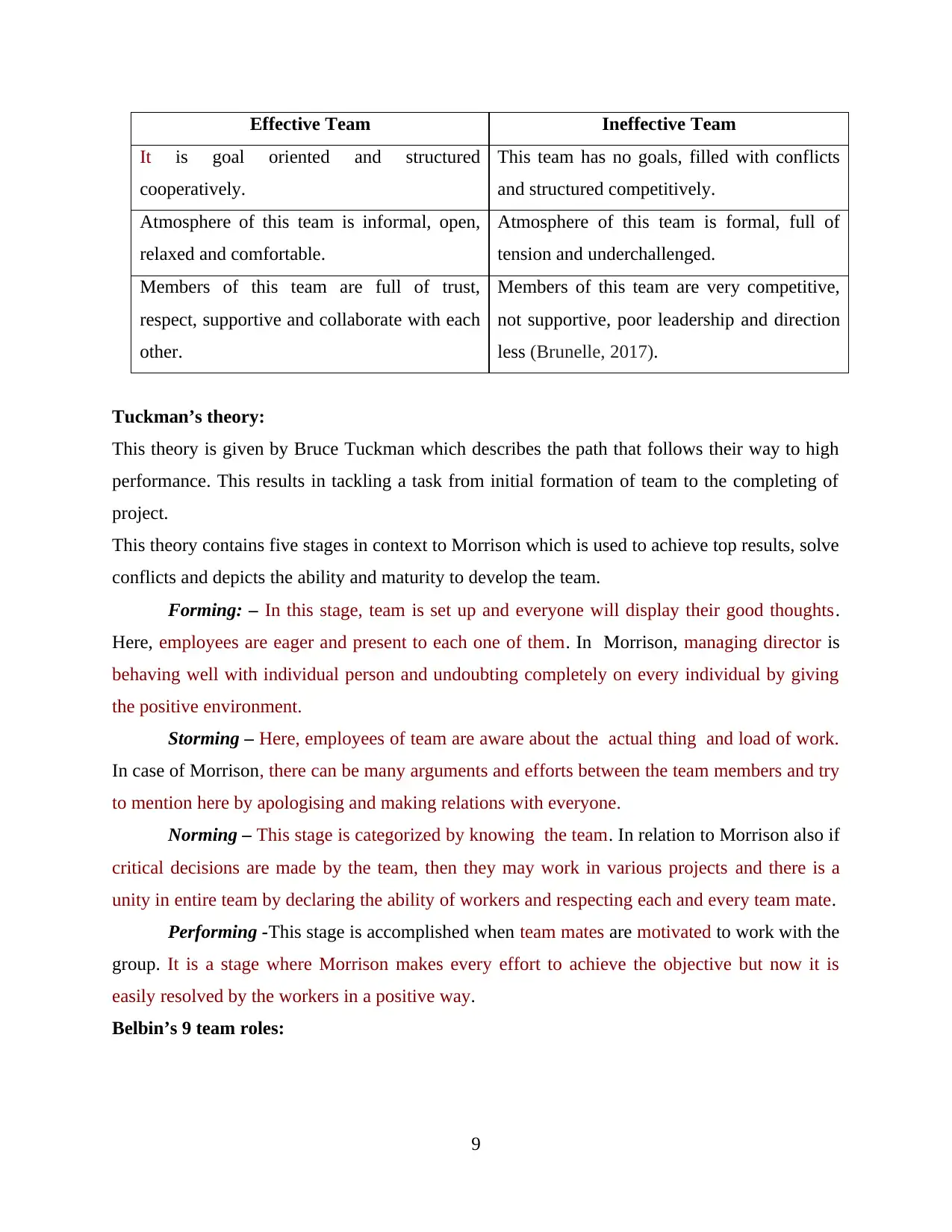
Effective Team Ineffective Team
It is goal oriented and structured
cooperatively.
This team has no goals, filled with conflicts
and structured competitively.
Atmosphere of this team is informal, open,
relaxed and comfortable.
Atmosphere of this team is formal, full of
tension and underchallenged.
Members of this team are full of trust,
respect, supportive and collaborate with each
other.
Members of this team are very competitive,
not supportive, poor leadership and direction
less (Brunelle, 2017).
Tuckman’s theory:
This theory is given by Bruce Tuckman which describes the path that follows their way to high
performance. This results in tackling a task from initial formation of team to the completing of
project.
This theory contains five stages in context to Morrison which is used to achieve top results, solve
conflicts and depicts the ability and maturity to develop the team.
Forming: – In this stage, team is set up and everyone will display their good thoughts.
Here, employees are eager and present to each one of them. In Morrison, managing director is
behaving well with individual person and undoubting completely on every individual by giving
the positive environment.
Storming – Here, employees of team are aware about the actual thing and load of work.
In case of Morrison, there can be many arguments and efforts between the team members and try
to mention here by apologising and making relations with everyone.
Norming – This stage is categorized by knowing the team. In relation to Morrison also if
critical decisions are made by the team, then they may work in various projects and there is a
unity in entire team by declaring the ability of workers and respecting each and every team mate.
Performing -This stage is accomplished when team mates are motivated to work with the
group. It is a stage where Morrison makes every effort to achieve the objective but now it is
easily resolved by the workers in a positive way.
Belbin’s 9 team roles:
9
It is goal oriented and structured
cooperatively.
This team has no goals, filled with conflicts
and structured competitively.
Atmosphere of this team is informal, open,
relaxed and comfortable.
Atmosphere of this team is formal, full of
tension and underchallenged.
Members of this team are full of trust,
respect, supportive and collaborate with each
other.
Members of this team are very competitive,
not supportive, poor leadership and direction
less (Brunelle, 2017).
Tuckman’s theory:
This theory is given by Bruce Tuckman which describes the path that follows their way to high
performance. This results in tackling a task from initial formation of team to the completing of
project.
This theory contains five stages in context to Morrison which is used to achieve top results, solve
conflicts and depicts the ability and maturity to develop the team.
Forming: – In this stage, team is set up and everyone will display their good thoughts.
Here, employees are eager and present to each one of them. In Morrison, managing director is
behaving well with individual person and undoubting completely on every individual by giving
the positive environment.
Storming – Here, employees of team are aware about the actual thing and load of work.
In case of Morrison, there can be many arguments and efforts between the team members and try
to mention here by apologising and making relations with everyone.
Norming – This stage is categorized by knowing the team. In relation to Morrison also if
critical decisions are made by the team, then they may work in various projects and there is a
unity in entire team by declaring the ability of workers and respecting each and every team mate.
Performing -This stage is accomplished when team mates are motivated to work with the
group. It is a stage where Morrison makes every effort to achieve the objective but now it is
easily resolved by the workers in a positive way.
Belbin’s 9 team roles:
9
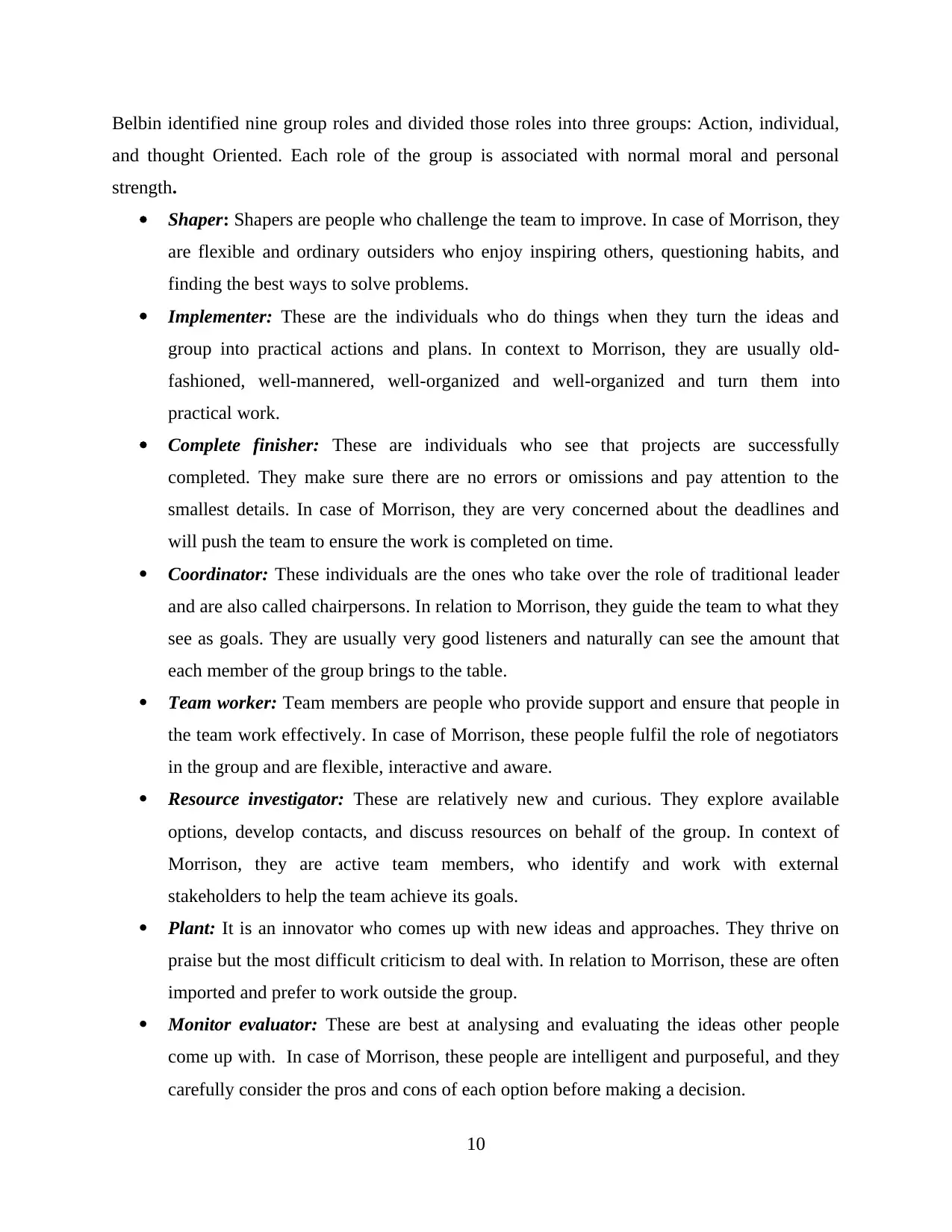
Belbin identified nine group roles and divided those roles into three groups: Action, individual,
and thought Oriented. Each role of the group is associated with normal moral and personal
strength.
Shaper: Shapers are people who challenge the team to improve. In case of Morrison, they
are flexible and ordinary outsiders who enjoy inspiring others, questioning habits, and
finding the best ways to solve problems.
Implementer: These are the individuals who do things when they turn the ideas and
group into practical actions and plans. In context to Morrison, they are usually old-
fashioned, well-mannered, well-organized and well-organized and turn them into
practical work.
Complete finisher: These are individuals who see that projects are successfully
completed. They make sure there are no errors or omissions and pay attention to the
smallest details. In case of Morrison, they are very concerned about the deadlines and
will push the team to ensure the work is completed on time.
Coordinator: These individuals are the ones who take over the role of traditional leader
and are also called chairpersons. In relation to Morrison, they guide the team to what they
see as goals. They are usually very good listeners and naturally can see the amount that
each member of the group brings to the table.
Team worker: Team members are people who provide support and ensure that people in
the team work effectively. In case of Morrison, these people fulfil the role of negotiators
in the group and are flexible, interactive and aware.
Resource investigator: These are relatively new and curious. They explore available
options, develop contacts, and discuss resources on behalf of the group. In context of
Morrison, they are active team members, who identify and work with external
stakeholders to help the team achieve its goals.
Plant: It is an innovator who comes up with new ideas and approaches. They thrive on
praise but the most difficult criticism to deal with. In relation to Morrison, these are often
imported and prefer to work outside the group.
Monitor evaluator: These are best at analysing and evaluating the ideas other people
come up with. In case of Morrison, these people are intelligent and purposeful, and they
carefully consider the pros and cons of each option before making a decision.
10
and thought Oriented. Each role of the group is associated with normal moral and personal
strength.
Shaper: Shapers are people who challenge the team to improve. In case of Morrison, they
are flexible and ordinary outsiders who enjoy inspiring others, questioning habits, and
finding the best ways to solve problems.
Implementer: These are the individuals who do things when they turn the ideas and
group into practical actions and plans. In context to Morrison, they are usually old-
fashioned, well-mannered, well-organized and well-organized and turn them into
practical work.
Complete finisher: These are individuals who see that projects are successfully
completed. They make sure there are no errors or omissions and pay attention to the
smallest details. In case of Morrison, they are very concerned about the deadlines and
will push the team to ensure the work is completed on time.
Coordinator: These individuals are the ones who take over the role of traditional leader
and are also called chairpersons. In relation to Morrison, they guide the team to what they
see as goals. They are usually very good listeners and naturally can see the amount that
each member of the group brings to the table.
Team worker: Team members are people who provide support and ensure that people in
the team work effectively. In case of Morrison, these people fulfil the role of negotiators
in the group and are flexible, interactive and aware.
Resource investigator: These are relatively new and curious. They explore available
options, develop contacts, and discuss resources on behalf of the group. In context of
Morrison, they are active team members, who identify and work with external
stakeholders to help the team achieve its goals.
Plant: It is an innovator who comes up with new ideas and approaches. They thrive on
praise but the most difficult criticism to deal with. In relation to Morrison, these are often
imported and prefer to work outside the group.
Monitor evaluator: These are best at analysing and evaluating the ideas other people
come up with. In case of Morrison, these people are intelligent and purposeful, and they
carefully consider the pros and cons of each option before making a decision.
10
⊘ This is a preview!⊘
Do you want full access?
Subscribe today to unlock all pages.

Trusted by 1+ million students worldwide
1 out of 17
Related Documents
Your All-in-One AI-Powered Toolkit for Academic Success.
+13062052269
info@desklib.com
Available 24*7 on WhatsApp / Email
![[object Object]](/_next/static/media/star-bottom.7253800d.svg)
Unlock your academic potential
Copyright © 2020–2026 A2Z Services. All Rights Reserved. Developed and managed by ZUCOL.



